|
|
Post by Bonobo on Jan 22, 2013 14:43:26 GMT 1
We are celebrating the 150th anniversary of January Uprising, the desperate attempt to liberate Poland from imperial Russian occupation during 19th century partitions. The odds were extremely uneven because only Polish gentry fought partisan war against tsarist Russians while most Polish peasants remained passive or even hostile to insurgents (except for peasants in Krakow region). Their national identity was still to be awakened after the lost Uprising. Archive pictures of Rising veterans from pre WW2 period: www.tvn24.pl/zdjecia/weterani-powstania-styczniowego,28480,lista.html en.wikipedia.org/wiki/January_Uprising
The January Uprising (Polish: powstanie styczniowe) was an uprising in the former Polish-Lithuanian Commonwealth (present-day Poland, Lithuania, Belarus, Latvia, parts of Ukraine, western Russia) against the Russian Empire. It began on 22 January 1863 and lasted until the last insurgents were captured in 1865.
The uprising began as a spontaneous protest by young Poles against conscription into the Imperial Russian Army, and was soon joined by high-ranking Polish-Lithuanian officers and various politicians. The insurrectionists, severely outnumbered and lacking serious outside support, were forced to resort to guerrilla warfare tactics. They failed to win any major military victories or capture any major cities or fortresses, but they did blunt the effect of the Tsar's abolition of serfdom in the Russian partition, which had been designed to draw the support of peasants away from the nation. Severe reprisals against insurgents, such as public executions and deportations to Siberia, led many people to abandon armed struggle and turn instead to the idea of "organic work": economic and cultural self-improvement.
Russian occupation  Battle:  Battle - a symbolic image  Aftermath - deportation to Siberia  See the partisan warfare with Polish shooters organizing an ambush on Russian cavalry and using their excellent newest rifles imported from Belgium just before the outbreak of the Rising. After initial Polish success, Russians prevail in the end and the village pond is red with blood of insurgents and their enemies. |
|
|
|
Post by tufta on Jan 22, 2013 17:22:02 GMT 1
Among many ill-equiped troops there were several well-equipped and well-trained. One of such was formed by the veteran of a Crimean War, Frenchman Franciszek Rochebrune. The guy could simply live peacefully in affluent and free France, eat well, sleep tight, indulge in sophisticated pasttimes and amusements, be happy he's a member of the free world. Having no family links with Poland he prefered to come to the enslaved country and help the Poles in their struggle for freedom. He formed a volunteer unit called ¯u³awi ¦mierci (Zouaves of Death). en.wikipedia.org/wiki/Zouaves_of_Death |
|
|
|
Post by Bonobo on Jan 22, 2013 18:58:47 GMT 1
Among many ill-equiped troops there were several well-equipped and well-trained. One of such was formed by the veteran of a Crimean War, Frenchman Franciszek Rochebrune. The guy could simply live peacefully in affluent and free France, eat well, sleep tight, indulge in sophisticated pasttimes and amusements, be happy he's a member of the free world. Having no family links with Poland he prefered to come to the enslaved country and help the Poles in their struggle for freedom. He formed a volunteer unit called ¯u³awi ¦mierci (Zouaves of Death). Tufta, do you know that most of his soldiers were recruited in Ojców near Krakow and Krakow itself. That is why I mentioned Krakow region peasants as the most patriotic at the time.      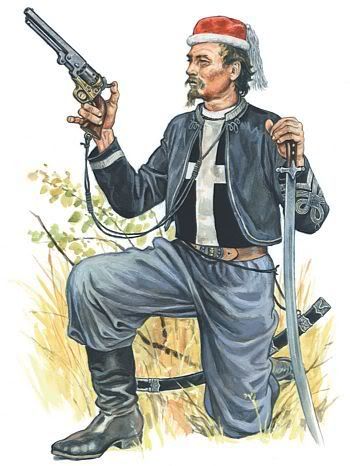 |
|
|
|
Post by tufta on Jan 23, 2013 9:20:12 GMT 1
Tufta, do you know that most of his soldiers were recruited in Ojców near Krakow and Krakow itself. That is why I mentioned Krakow region peasants as the most patriotic at the time.    I do, Bo  Those Krakovians, you are always first to fight! |
|
|
|
Post by Bonobo on Jan 24, 2013 19:21:56 GMT 1
|
|
|
|
Post by Bonobo on Feb 3, 2013 10:53:40 GMT 1
Battle of Wêgrów was one of the most famous skirmishes of January Uprising. It took place February 3, 1863 near Wêgrów in east Masovia.
On January 22, Polish partisans liberated a town from Russians forces. Here Poles established a military base, in a few days gathering almost 3,500 soldiers.
But the Russians decided to recapture Wêgrów by rapid attack force composed of a 1,000-strong unit with artillery, led by colonel Georgi Papaafanasopulo. The Poles were threatened by encirclement, and Polish commander Jan Matliñski ordered a retreat from the town. He left about 500 scythemen to cover the retreat of the main forces. Scythemen attacked the Russian left flank and routed Russian cavalry squadron and cannons, ensuring the safe retreat of the Polish forces from the town. Almost all attacking scythemen were killed by Russian infantry fire. Russians entered the town, but most of the Polish forces had already left it.
The Polish attack was heard of throughout Europe. French poet Henri Auguste Barbier wrote a poem Attack at Wêgrów, comparing the Polish fighters to Spartans at the Battle of Thermopylae. The Polish poet Cyprian Kamil Norwid, writing in France, also compared the battle to Thermopylae. Maria Konopnicka also wrote a poem about the event, in which she referenced Barbier's work. As a result the battle is sometimes called the "Polish Thermopylae."   
|
|
|
|
Post by propatriapoland on Jan 28, 2019 15:29:17 GMT 1
Artur Grottger - one of the significant representatives of the Polish national school of historical painting. Author of paintings and a series of "cartons" about the January Uprising.
|
|
|
|
Post by Bonobo on Jan 28, 2019 20:51:52 GMT 1
Artur Grottger - one of the significant representatives of the Polish national school of historical painting. Author of paintings and a series of "cartons" about the January Uprising. And his most famous painting of the event is Reforging Scythes. It suggests that insurgents were mainly armed with scythes, which is a popular myth. Scythes could be a deadly weapon but were no match to modern carbines. Insurgents, just before the outbreak of the Rising, managed to buy a dozen thousand excellent Belgian rifles and used them in sharpshooting style. You can see it in this informative fragment of a poor film (I left the cinema before the end because it was so stupidly sentimental) about the Rising. The skirmish with a Russian squadron starts at 2.48 and goes on but it is cut and skips the end. After the initial failures, Russians brought artillery and decimated the insurgents.  |
|
|
|
Post by Bonobo on Jan 22, 2022 15:04:53 GMT 1
A good article describing in detail the Polish motives to start the Rising www.onet.pl/informacje/histmag/co-zmotywowalo-polakow-by-z-kijami-i-bronia-mysliwska-ruszyc-na-rosyjskie-dziala-i/ed2l6l0,30bc1058 What motivated the Poles to attack Russian cannons and rifles with sticks and hunting weapons during the January Uprising?
The January Uprising broke out on the night of January 22-23, 1863. What reasons motivated the Poles to use sticks and hunting weapons to launch Russian cannons and rifles in line with the recommendations of Ludwik Mierosławski?
Mateusz Balcerkiewicz
5.1K
Today, 07:00
You can read this text in 5 minutes
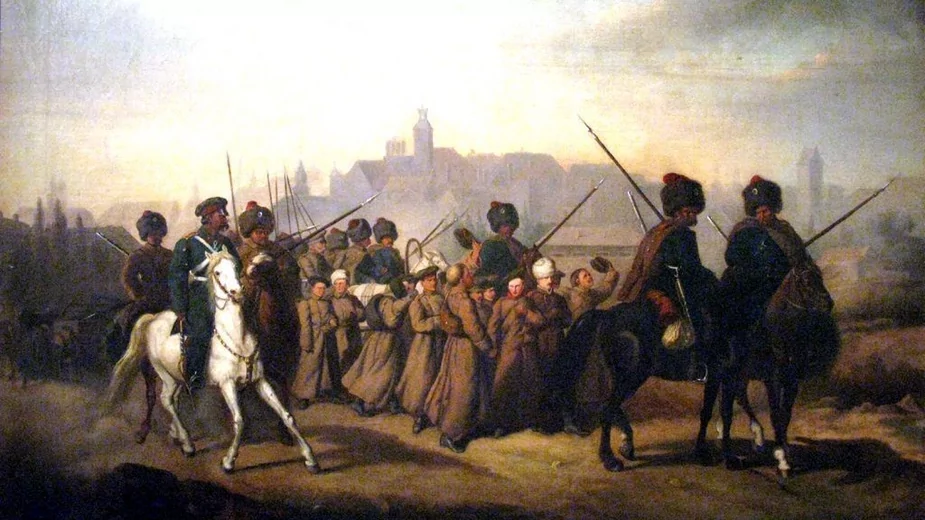
Branka of Poles to the Russian army (author: Aleksander Sochaczewski, public domain)Branka of Poles to the Russian army (author: Aleksander Sochaczewski, public domain) - Aleksander Sochaczewski / Historical portal Histmag.org
The Crimean War in 1853-1856 exposed the military weakness and imperfections of the army of the Russian Empire. The Russians lost not only because of inferior-quality weapons - the organization of the army also failed, and the situation was additionally worsened by widespread corruption and thefts in the administration. It even happened that the defending Russian troops suffered greater losses than the attacking side! This gave the Poles under Russian occupation hope that there was another chance to gain independence.
Before the January Uprising started, there were many more reasons for this. As a result of the Crimean War, not only Russia's military strength declined. In the West, Tsar Nicholas I was blamed for the outbreak of the bloody conflict, which claimed a total loss of half a million. In the west, Tsarist Russia appeared to be a barbaric power against which a victorious war had just been waged. Therefore, the nations oppressed by it (including Poles) and their independence aspirations were viewed favorably.
Social movements, initiated by the Spring of Nations, continued to gain momentum. The Italian il Risorgimento , lasting from 1859 , which two years later led to the final unification of the Apennine Peninsula, showed that such aspirations made sense and stimulated the imagination in the partitions.
The January Uprising - causes: conspiracies and demonstrations on the eve of the outbreak
As early as 1856, independence organizations began to form. The General was established at the university in Kiev, later transformed into the Trojny Union. The Circle of Polish Officers in St. Petersburg was established in the capital of the empire. In Warsaw, it was conspiratorial mainly in academic circles - secret circles were created, among others, at the Medical and Surgical Academy or the School of Fine Arts. Even in the Warsaw Main School, opened with the consent of the tsar in 1862, illegal organizations quickly arose. In May 1858, Narcis Jankowski came to Warsaw from Kiev, who was not only involved in organizing underground activities, but also in military training of students.
The plans for the outbreak of the uprising began in 1859. Two years later, the Polish Military School was established in Genoa. About 200 people attended it, who were to lead the fight in the future. Increasingly hotter social moods were expressed in a series of patriotic speeches. The most famous are: the convention on June 11, 1860 on the occasion of the funeral of the widow of General Józef Sowiński, the disruption of the convention of monarchs in Warsaw in October 1860, or the demonstration on November 29 this year, on the 30th anniversary of the November Uprising.
During the latter event, the song of Jan Nepomucen, Piotr Kraszewski, known to us today with a changed text under the name "God, Something Polskę" was sung. The original text was the work of Alojzy Feliński, commissioned in honor of Tsar Alexander I by Prince Konstanty. The Poles removed the regalistic threads from the song, and the ending line "Our King, save us, Lord", changed to "Our Lord, please come back to us free."
The wrath of the ruler of Russia
The growing independence sentiment could not remain unanswered by the tsar. And it was an extremely brutal response. The celebration of the aforementioned anniversary of the events of 1830 was interrupted by soldiers who dispersed the crowd demonstrating. Similarly, on February 25, 1861, participants of the celebration of the 30th anniversary of the battle for Olszynka Grochowska were driven away. Two days later, firearms were used against demonstrators in Krakowskie Przedmieście.
As a result, five participants were killed. The fallen - a tailor's apprentice, metal worker, high school student and two landowners - represented various social groups and environments. Their death became a symbol of Russian repression against the entire Polish society. The solemn funeral on March 2 turned into another demonstration, and the event was even loud in the provinces. There have been cases of officials being thrown out by angry landowners, which the Russian garrisons could not always react to, as most of the soldiers were deployed to protect the capital.
In April of the same year, demonstrators were shot again at Castle Square. This time there were many more victims - one hundred killed and a further several hundred wounded. The former governor of the Kingdom of Poland died in May, and Nikolai Suchozanet, who was taking his office, further aggravated the repressions. Prison was threatened for any manifestation of Polishness - even provocative clothes could lead to arrest. The enthusiasm of Poles, however, did not diminish, and therefore Tsar Alexander II decided to create a certain form of self-government at the level of cities and poviats. By orders of June 18, a new law was proclaimed and the repression eased somewhat by the end of the elections.
The stubbornness of Poles
However, it did not have the intended effect. The demonstrations continued and only grew stronger. After the thousand-strong speech in Vilnius was suppressed, martial law was announced on August 22 in the Vilnius, Grodno and Kaunas governorates. On October 14, 1861, the new governor, General Count Charles Lambert, took the entire Kingdom under martial law. Nevertheless, a day later, a solemn celebration of the anniversary of Tadeusz Kościuszko's death was organized. The pacification of this event turned into a bloody slaughterhouse - soldiers were breaking into churches and kidnapping people there. As a sign of protest, the diocese of Warsaw decided to close all churches in the city. After a few days, Lambert bowed - he released most of those arrested during the October 15 ceremony and resigned.
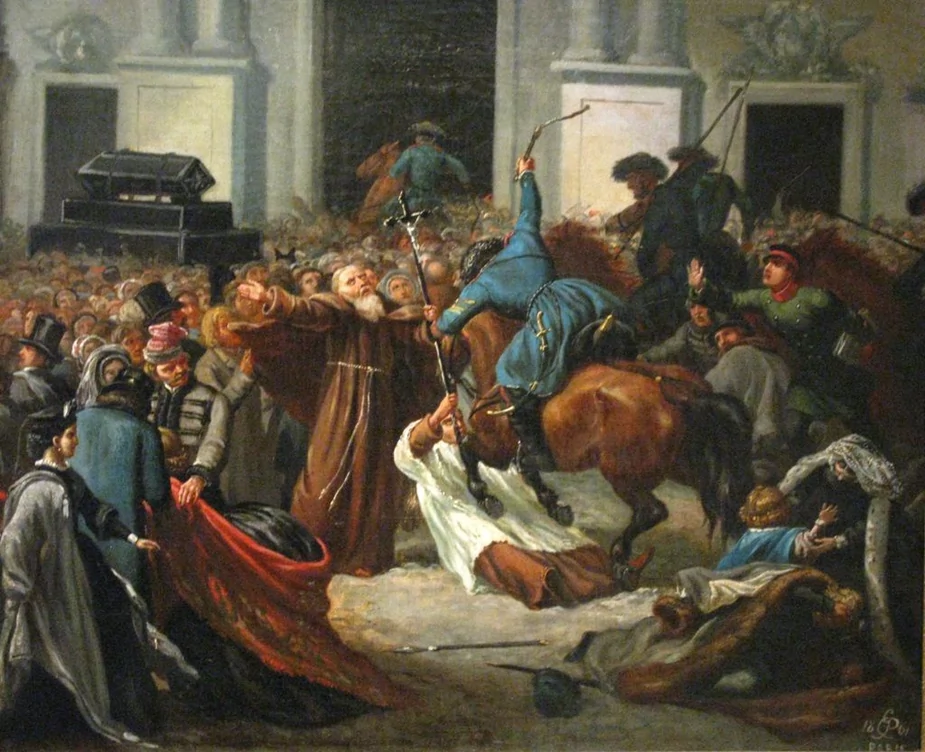
Cossacks chasing participants of a patriotic demonstration in the church of St. Anna (public domain)Cossacks chasing participants of a patriotic demonstration in the church of St. Anny (public domain) - Domena publiczna / Portal historical Histmag.org
General Count Aleksandr Lüders was to try to calm the Poles. It is worth mentioning here a certain Russian captain who heroically defied the tsar. In April 1862, a cable from Russia arrived in Warsaw, which specified the method of counteracting potential demonstrations on the anniversary of last year's massacre. It was recommended to use a slash weapon, and in case of major problems - to shoot at demonstrators with cannons. The head of the military telegraph station Captain Alexandrov decided to change its content and order conservative handling of the demonstrators. However, his fraud was uncovered and he himself was sentenced to be shot by a military court. The tsar decided to change this sentence into a life sentence.
Reforms and the idea of Wielopolski
Aleksander Wielopolski (photo: Karol Beyer, public domain)Aleksander Wielopolski (photo: Karol Beyer, public domain) - Karol Beyer / Historical portal Histmag.org
The issue of Poland was becoming problematic for the ruler of Russia, the more so as it involved more and more troops and resources that were needed elsewhere. Thus, at the beginning of 1862, a decision was made to introduce reforms to calm the mood. This time it was not supposed to be just a substitute for local governments, but the entire civil government. However, there was no question of a constitution, military or any political autonomy. The government was to be headed by a Pole - Aleksander Wielopolski, a man whose draft "law on concurrents" made it possible to shoot a hundred demonstrators on April 8, 1861.
ADVERTISEMENT
ADVERTISEMENT
On the other hand, with his actions, he curbed the arbitrariness of many tsarist officials, introduced Poles to offices and fought for the development of education, also in Polish. It was thanks to his persuasions that the tsar agreed to the project of quite serious concessions and did not withdraw from them, despite the fact that in 1862 there was a series of unsuccessful attacks - in June on governor Lüders, in July on the brother of tsar prince Konstanty Mikołajewicz and in August twice on Wielopolski itself.
However, not everyone in the Kingdom strove for open military confrontation. The Polish underground was divided into two camps - the Red group planning a fight and fueling the militant mood in the country, and the White party, which saw opportunities in organic work, forcing concessions and waiting for more favorable circumstances. The latter, seeing the risk of an uprising prepared by the Reds, even wanted to cooperate with Wielopolski, who was striving for the status quo , but the latter refused. Nevertheless, he introduced a new school law, compulsory renting of peasants and equality for the Jewish population, which he hoped to calm the moods.
They came for them at night
Wielopolski knew about the active red group and the fact that they were preparing an uprising. His idea to deal with the rebels was a prisoner to the army organized every year. Drafting into the tsarist army was almost tantamount to a death sentence - few of the called-ups managed to return home after the service, and even if they were, they were usually sick or severely mutilated. This time, however, the captive was not to take place by drawing, but on the basis of a carefully prepared list of people suspected of belonging to the anti-Russian movement. It became the direct cause of the accelerated outbreak of the uprising.
Branka of Poles to the Russian army (author: Aleksander Sochaczewski, public domain)Branka of Poles to the Russian army (author: Aleksander Sochaczewski, public domain) - Aleksander Sochaczewski / Historical portal Histmag.org
The planned action could not be kept completely secret, therefore, on January 3, the National Central Committee, consisting of Oskar Awejdy, Józef Kajetan Janowski, Jan Maykowski, Zygmunt Padlewski and priest Karol Mikoszewski, decided to start the uprising with the start of the captivity. The one in Warsaw took place on the night of January 14-15. Many conscripts managed to escape, and then began to organize into armed groups. On January 19, the Central National Committee appointed the first dictator of the uprising, quoted in the introduction by Ludwik Mierosławski. In the provinces, captives were to take place on January 25, so the Russians had to be scavenged. On the night of January 22-23, 1863, the National Central Committee issued a manifesto in which it declared itself the Provisional National Government and called on all Poles to fight.
Bibliography:
155 years ago the January Uprising broke out [in:] czas.pl , January 17, 2019 [accessed January 17, 2019]
Łossowski Piotr, Zygmunt Młynarski, Russians, Belarusians, Ukrainians in the January Uprising , National Institute of Ossoliński, Wrocław 1959.
Pawliszczew Mikołaj, Weeks of the Polish Rebellion , vol. II, Bellona Publishing House, Warsaw 2003.
Stankiewicz Zbigniew, The history of the greatness and fall of Aleksander Wielopolski , Wiedza Powszechna, Warsaw 1967.
Szarek Jarosław, The January Uprising: Free Poles Rising , AA Publishing House, Krakow 2013.
Source:
Historical portal Histmag.org
Creation Date: Today, 07:00 |
|


















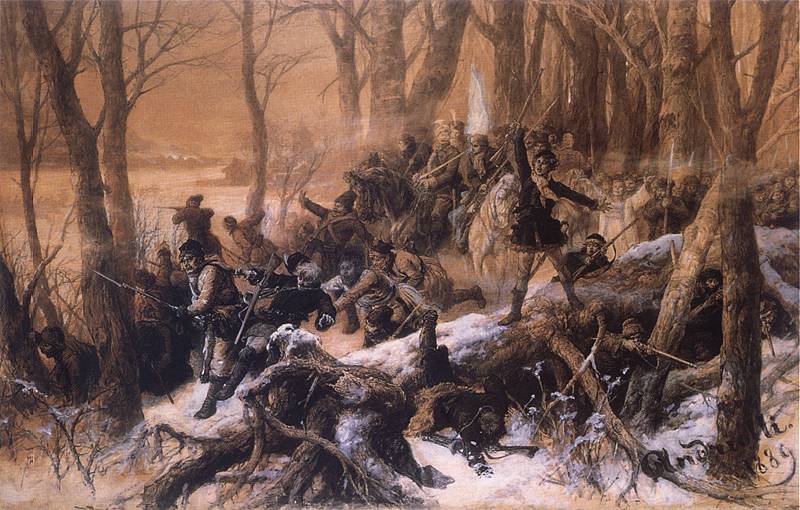

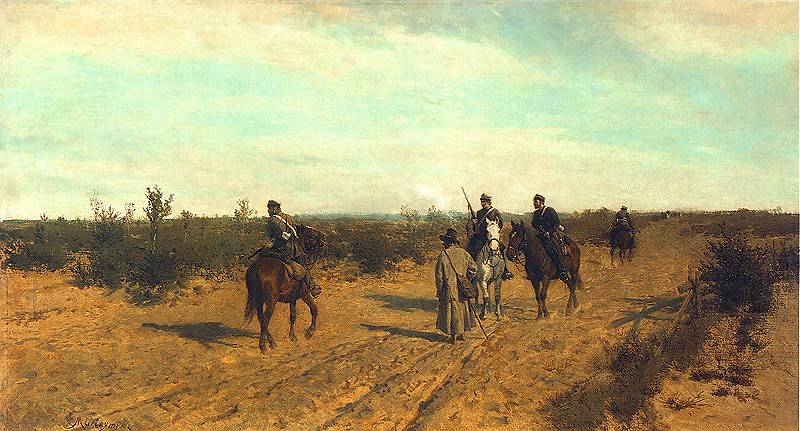
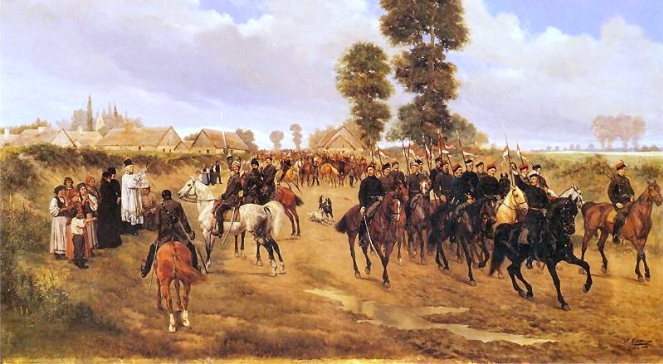
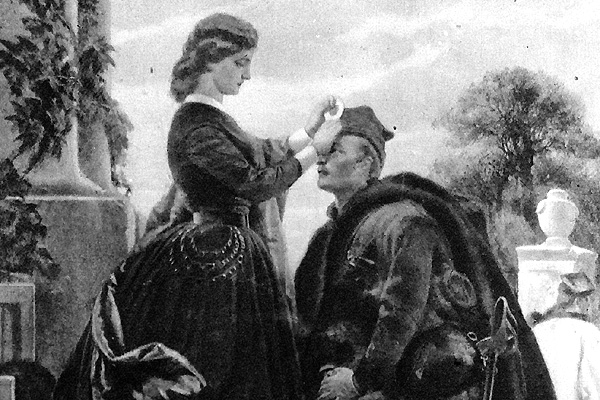

.JPG)
.JPG)



